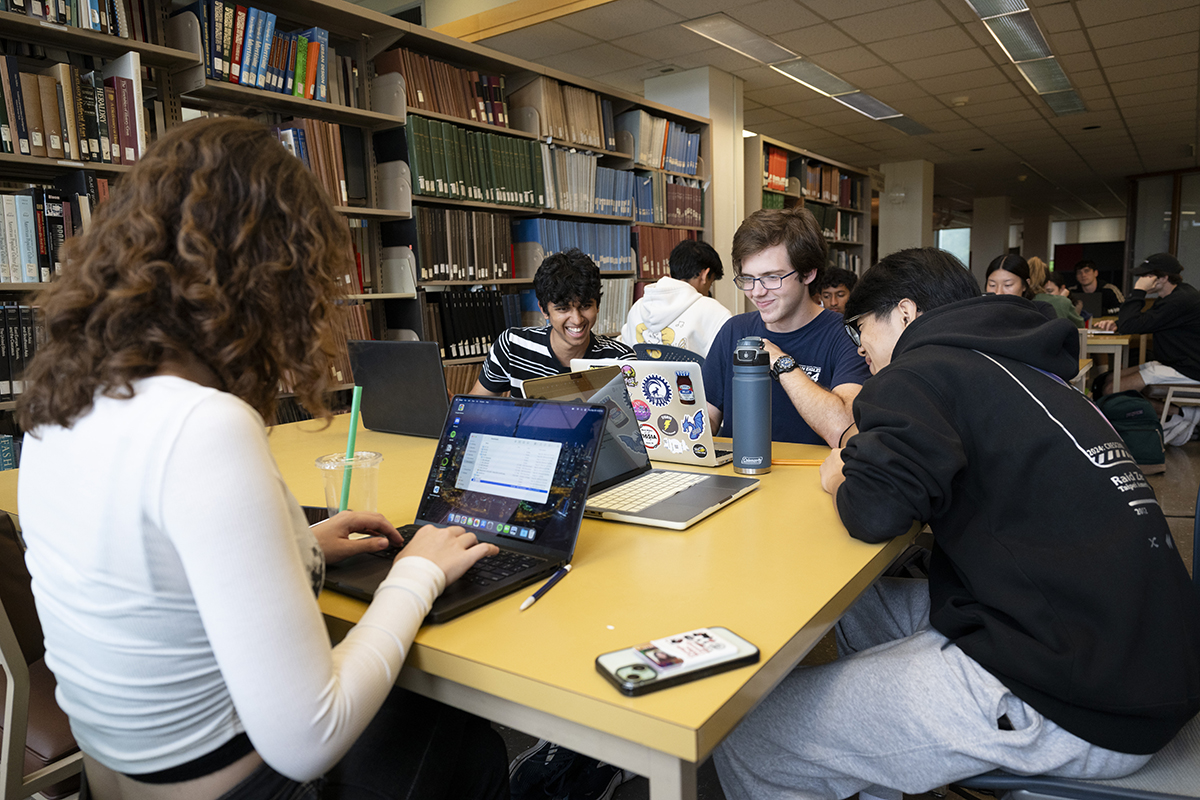
Technological innovations are a steady part of human history, and some of these innovations have radically changed society from top to bottom. In the past century, some examples include television, cell phones and personal computers.
Today, the latest technology one hears about at every turn is AI and its proliferating role in society. But trying to adapt to this new technology leads to many questions. How can we best incorporate AI into our work? Where does AI and other technologies fit into teaching and learning? How should one manage or lead with these newest tools in technology? Where do ethics fit in? Does AI affect our humanity?
Explore the eBooks and streaming movies below to learn more about how to blend AI into our lives, while retaining the skills and knowledge that makes us human.
Each month, "Discover & Discuss" presents a fresh theme designed to inform, inspire, and connect our community with a curated selection of books and digital resources that invite deeper thinking and dialogue.
Special thanks to our Materials Processing Coordinator, Leah Zande, for compiling this list. Feature image by Rebecca Devereaux.
eBooks
AI for Humanity: Building a Sustainable AI for the Future
Ma, Andeed; Ong, James; Tan, Siok Siok (2024)
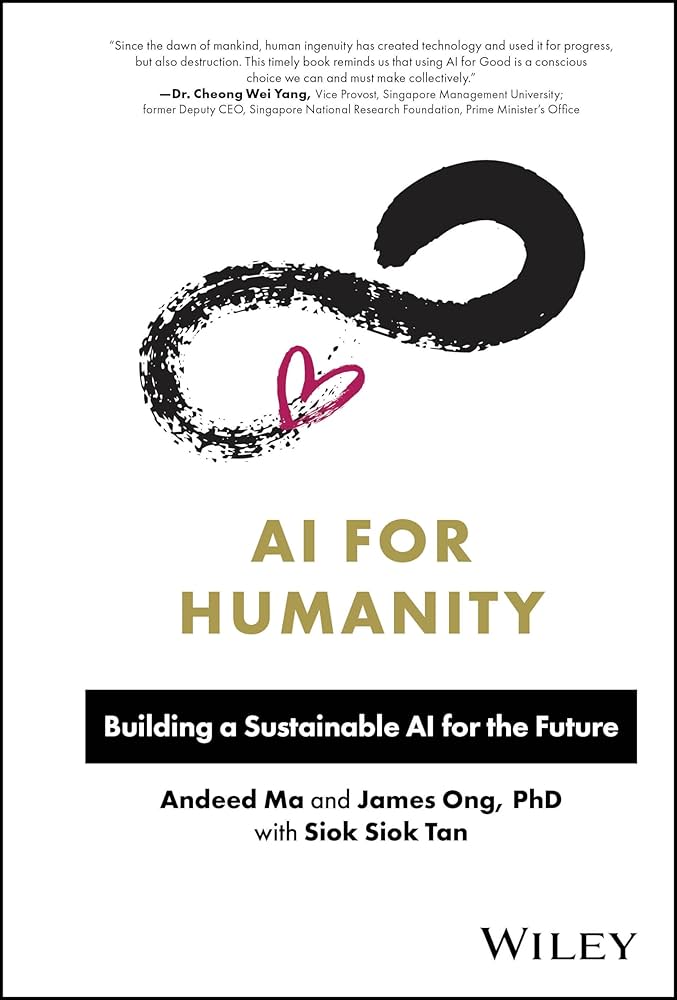 "AI For Humanity: Building a Sustainable AI for the Future" delivers an incisive and timely discussion of how to design, build, and implement cutting-edge AI in for-profit firms and other organizations in a responsible, sustainable, and ethical way. The book walks you through the three pillars of human-focused AI development―governance, technology, and commercialization―and dives deep into each one, showing you how to create
"AI For Humanity: Building a Sustainable AI for the Future" delivers an incisive and timely discussion of how to design, build, and implement cutting-edge AI in for-profit firms and other organizations in a responsible, sustainable, and ethical way. The book walks you through the three pillars of human-focused AI development―governance, technology, and commercialization―and dives deep into each one, showing you how to create
AI products and services that better humanity and advance universally held values. You'll find methodologies and frameworks that mitigate against some of the most profound and unsettling risks of unchecked artificial intelligence development, and roadmaps to help you avoid the numerous pitfalls and traps awaiting unsuspecting companies, managers, and executives. - Publisher's Description
Request this Title
Thinking with AI: Machine Learning the Humanities
Bajohr, Hannes (2025)
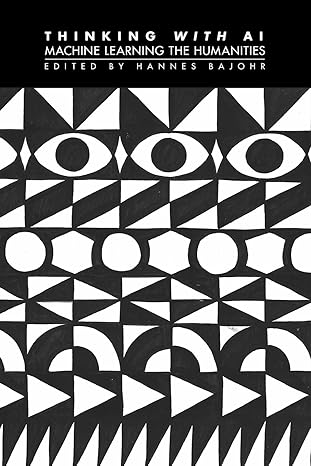 This collected volume explores a novel approach to the intersection of artificial intelligence and the humanities, proposing that instead of merely writing about AI, scholars should think with AI.
This collected volume explores a novel approach to the intersection of artificial intelligence and the humanities, proposing that instead of merely writing about AI, scholars should think with AI.
Rather than treating AI as an external subject of study, the essays explore how concepts from artificial intelligence, machine learning, and data science can provide ways to rethink core humanistic questions of meaning, representation, and culture. Critical AI Studies typically focuses on AI’s societal implications—its role in surveillance, exclusion, and global capitalism. This volume extends that critique, but also explores how AI brings our already existing understanding of aesthetics, language, history, and knowledge into relief and stands in an often productive conflict with them. AI’s pattern recognition and generative capabilities, for example, provokes new ways to grasp aesthetic unity, reimagine language as an autonomous system, and reconsider the boundaries between text and image.
The essays illustrate how AI can be used as a productive metaphor and intellectual tool for the humanities. From formalizing concepts like Stimmung and vibe to challenging traditional distinctions between writing and thought or between history and data, the book shows how AI can be not just an object of study but a conceptual catalyst that ignites unexpected connections to long-standing humanistic concerns. By engaging AI in this way, scholars can not only critique it but also expand the horizons of their own fields. - Publisher's Description
Request this Title
Moral Codes: Designing Alternatives to AI
Blackwell, Alan (2024)
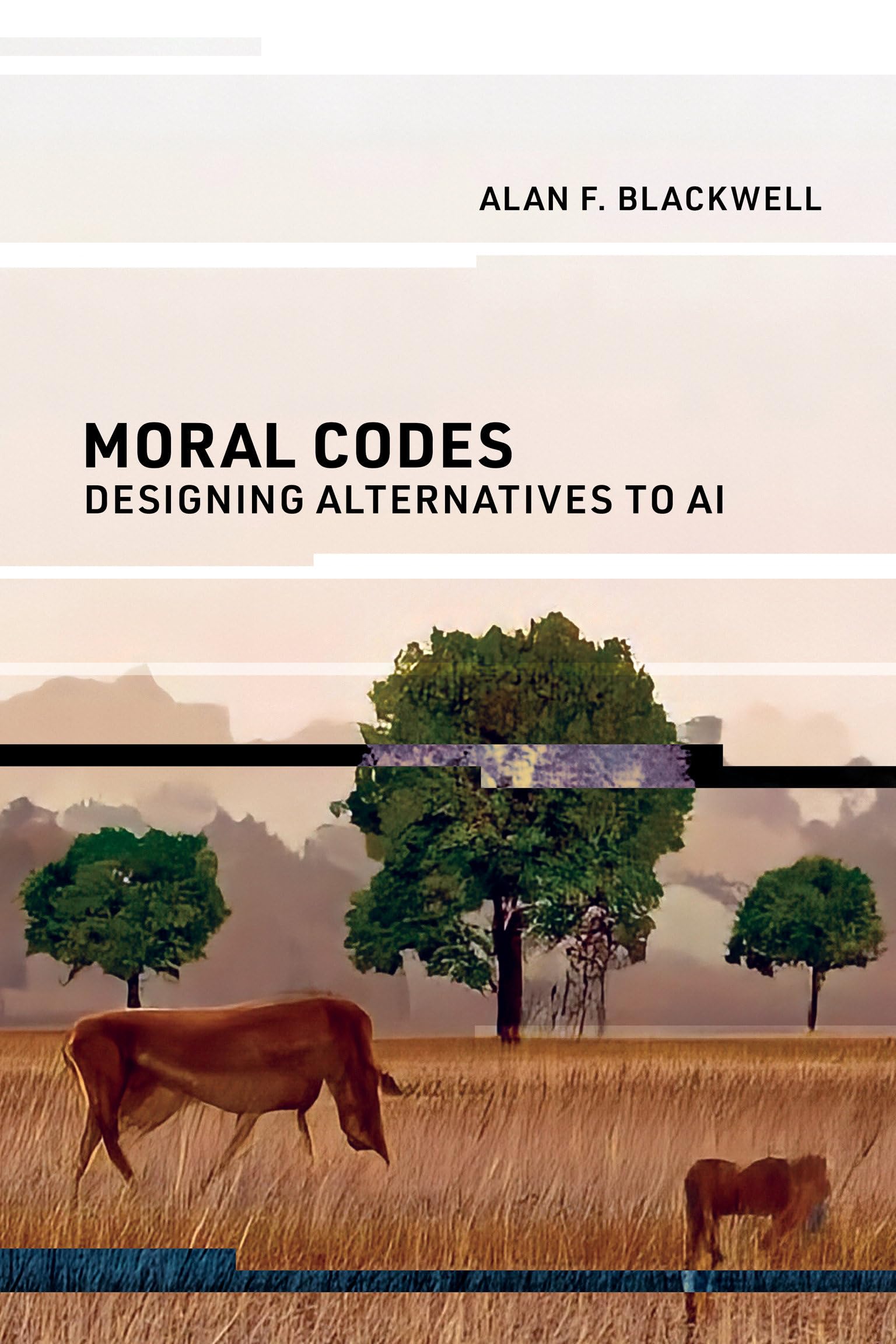 Decades ago, we believed that robots and computers would take over all the boring jobs and drudgery, leaving humans to a life of leisure. This hasn't happened. Instead, humans are still doing boring jobs, and even worse, AI researchers have built technology that is creative, self-aware, and emotional—doing the tasks humans were supposed to enjoy. How did we get here? In "Moral Codes," Alan Blackwell argues that there is a fundamental flaw in the research agenda of AI. What humanity needs, Blackwell argues, is better ways to tell computers what we want them to do, with new and better programming languages: More Open Representations, Access to Learning, and Control Over Digital Expression, in other words, MORAL CODE.
Decades ago, we believed that robots and computers would take over all the boring jobs and drudgery, leaving humans to a life of leisure. This hasn't happened. Instead, humans are still doing boring jobs, and even worse, AI researchers have built technology that is creative, self-aware, and emotional—doing the tasks humans were supposed to enjoy. How did we get here? In "Moral Codes," Alan Blackwell argues that there is a fundamental flaw in the research agenda of AI. What humanity needs, Blackwell argues, is better ways to tell computers what we want them to do, with new and better programming languages: More Open Representations, Access to Learning, and Control Over Digital Expression, in other words, MORAL CODE.
Blackwell draws on his deep experiences as a programming language designer—which he has been doing since 1983—to unpack fundamental principles of interaction design and explain their technical relationship to ideas of creativity and fairness. Taking aim at software that constrains our conversations with strict word counts or infantilizes human interaction with likes and emojis, Blackwell shows how to design software that is better—not more efficient or more profitable, but better for society and better for all people. Covering recent research and the latest smart tools, Blackwell offers rich design principles for a better kind of software—and a better kind of world. - Publisher's Description
Request this Title
The AI Mirror: How to Reclaim our Humanity in an Age of Machine Thinking
Vallor, Shannon (2024)
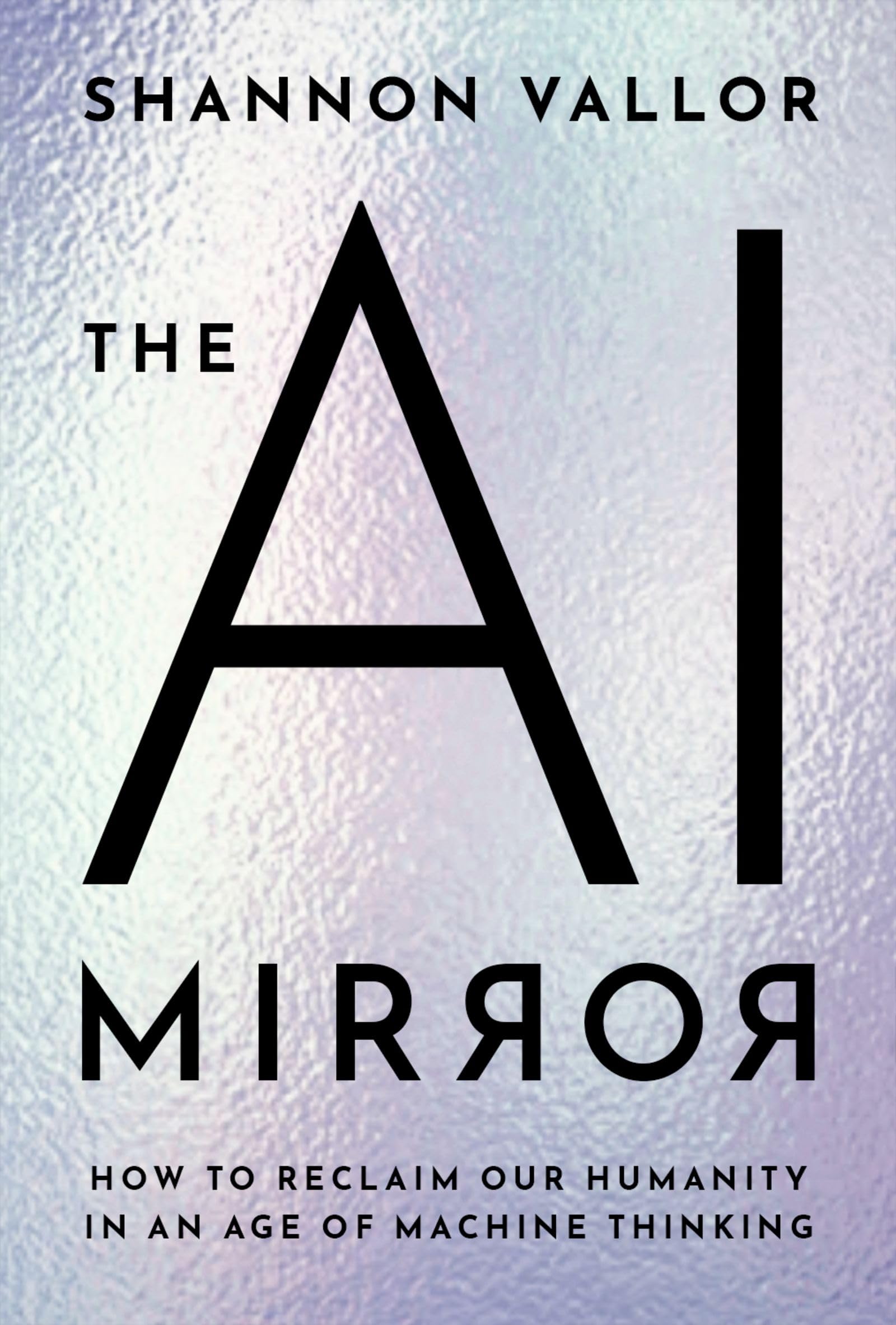 For many, technology offers hope for the future―that promise of shared human flourishing and liberation that always seems to elude our species. Artificial intelligence (AI) technologies spark this hope in a particular way. They promise a future in which human limits and frailties are finally overcome―not by us, but by our machines.
For many, technology offers hope for the future―that promise of shared human flourishing and liberation that always seems to elude our species. Artificial intelligence (AI) technologies spark this hope in a particular way. They promise a future in which human limits and frailties are finally overcome―not by us, but by our machines.
Yet rather than open new futures, today's powerful AI technologies reproduce the past. Forged from oceans of our data into immensely powerful but flawed mirrors, they reflect the same errors, biases, and failures of wisdom that we strive to escape. Our new digital mirrors point backward. They show only where the data say that we have already been, never where we might venture together for the first time. To meet today's grave challenges to our species and our planet, we will need something new from AI, and from ourselves. Shannon Vallor makes a wide-ranging, prophetic, and philosophical case for what AI could be: a way to reclaim our human potential for moral and intellectual growth, rather than lose ourselves in mirrors of the past. Rejecting prophecies of doom, she encourages us to pursue technology that helps us recover our sense of the possible, and with it the confidence and courage to repair a broken world. Vallor calls us to rethink what AI is and can be, and what we want to be with it. - Publisher's Description
Request this Title
Complex AI Dynamics and Interactions in Management
Figueiredo, Paula Cristina Nunes (2024)
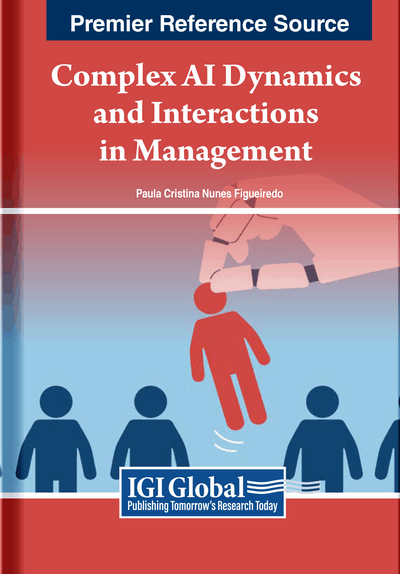 Artificial Intelligence (AI) permeates our daily lives, revolutionizing routine tasks. However, the profound implications of AI on business management demand meticulous scrutiny. Leaders and organizations must proactively shape strategies to align with the tenets of this new era. This necessitates a commitment to innovatively amalgamate data, technology, design, and human expertise to address real-world challenges on a large scale. Beyond concerns about the future of work and potential job displacement due to automation, societal readiness at all levels becomes paramount for AI to benefit humanity. Complex AI Dynamics and Interactions in Management guides leaders and organizations navigating this transformative era. It facilitates a seamless transition by advocating successful AI initiatives, discerning optimal opportunities, fostering diverse expert teams, conducting strategic experiments, and crafting solutions that contribute to the benefit of both the organization and society.
Artificial Intelligence (AI) permeates our daily lives, revolutionizing routine tasks. However, the profound implications of AI on business management demand meticulous scrutiny. Leaders and organizations must proactively shape strategies to align with the tenets of this new era. This necessitates a commitment to innovatively amalgamate data, technology, design, and human expertise to address real-world challenges on a large scale. Beyond concerns about the future of work and potential job displacement due to automation, societal readiness at all levels becomes paramount for AI to benefit humanity. Complex AI Dynamics and Interactions in Management guides leaders and organizations navigating this transformative era. It facilitates a seamless transition by advocating successful AI initiatives, discerning optimal opportunities, fostering diverse expert teams, conducting strategic experiments, and crafting solutions that contribute to the benefit of both the organization and society.
This book is a valuable resource for managers and decision-makers, providing insights on leveraging AI to enhance business sustainability. This initiative allows collaboration among stakeholders, including professionals from public and private sectors, human resources specialists, data experts, and academics from various countries. - Publisher's Description
Request this Title
As If Human: Ethics and Artificial Intelligence
Shadbolt, Nigel; Hampson, Roger (2024)
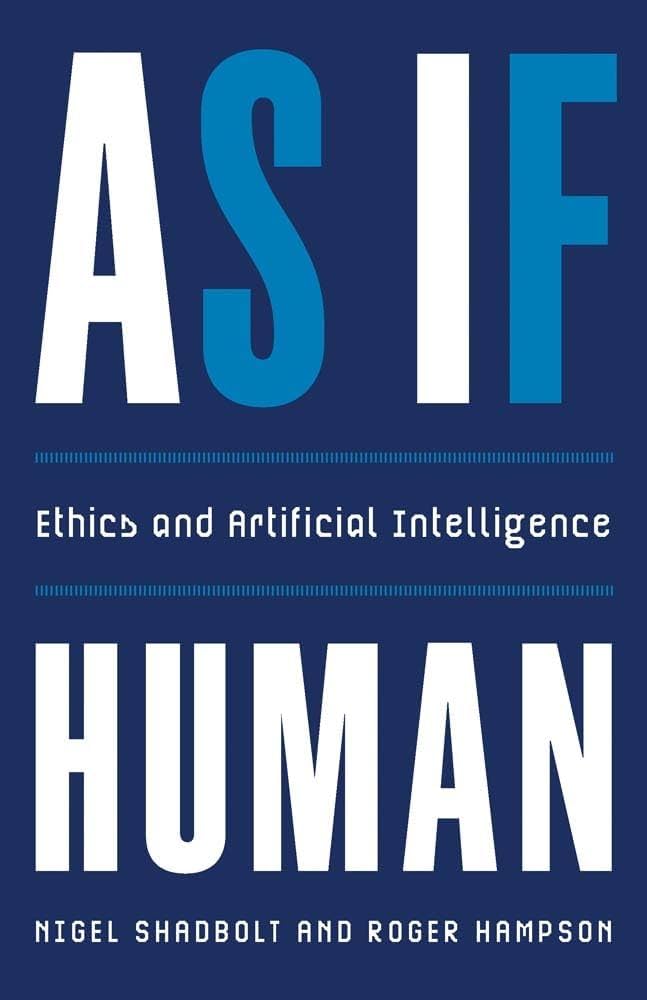 Intelligent machines present us every day with urgent ethical challenges. Is the facial recognition software used by an agency fair? When algorithms determine questions of justice, finance, health, and defense, are the decisions proportionate, equitable, transparent, and accountable? How do we harness this extraordinary technology to empower rather than oppress?
Intelligent machines present us every day with urgent ethical challenges. Is the facial recognition software used by an agency fair? When algorithms determine questions of justice, finance, health, and defense, are the decisions proportionate, equitable, transparent, and accountable? How do we harness this extraordinary technology to empower rather than oppress?
Despite increasingly sophisticated programming, artificial intelligences share none of our essential human characteristics—sentience, physical sensation, emotional responsiveness, versatile general intelligence. However, Nigel Shadbolt and Roger Hampson argue, if we assess AI decisions, products, and calls for action as if they came from a human being, we can avert a disastrous and amoral future. The authors go beyond the headlines about rampant robots to apply established moral principles in shaping our AI future. Their new framework constitutes a how-to for building a more ethical machine intelligence. - Publisher's Description
Request this Title
Age of Agency: Rise with AI
Govender, Kerushan (2024)
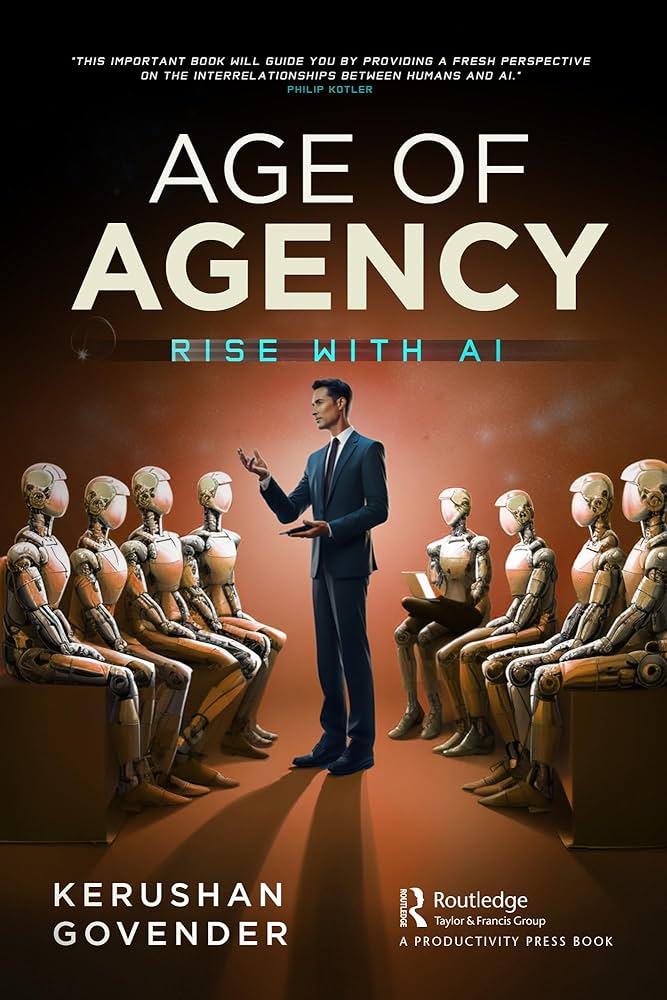 Do you feel overwhelmed by the AI wave? Worried that it could cost you your job, harm your business, or even take over? AI has pervaded our lives and is aggressively disrupting business. No person today can afford to ignore AI.
Do you feel overwhelmed by the AI wave? Worried that it could cost you your job, harm your business, or even take over? AI has pervaded our lives and is aggressively disrupting business. No person today can afford to ignore AI.
"Age of Agency" is your companion, helping you leverage AI's capabilities to power your productivity and success. By understanding AI, you will learn to use it as a tool for personal career growth and business success. Former Microsoft executive Kerushan Govender demystifies AI, emphasising the importance of human agency. Reconnect with the needs of humanity and learn the importance of care as a differentiator in an AI world. Avoid the potential pitfalls of excessive reliance on the technology.
"Age of Agency" is a blueprint for ensuring human agency outpaces computer agency. It boldly pits the limits of machine learning against the infinity of human ability. With this survival guide, you’ll uncover ways to connect with humanity on a deeper level, going beyond anything AI can do. Ready to become AI-savvy, with your humanity as your differentiator? Dive into the future with the confidence to ride the wave of today’s AI revolution. - Publisher's Description
Request this Title
AI and Emotions in Digital Society
Scribano, Adrian; Korstanje, Maximiliano (2024)
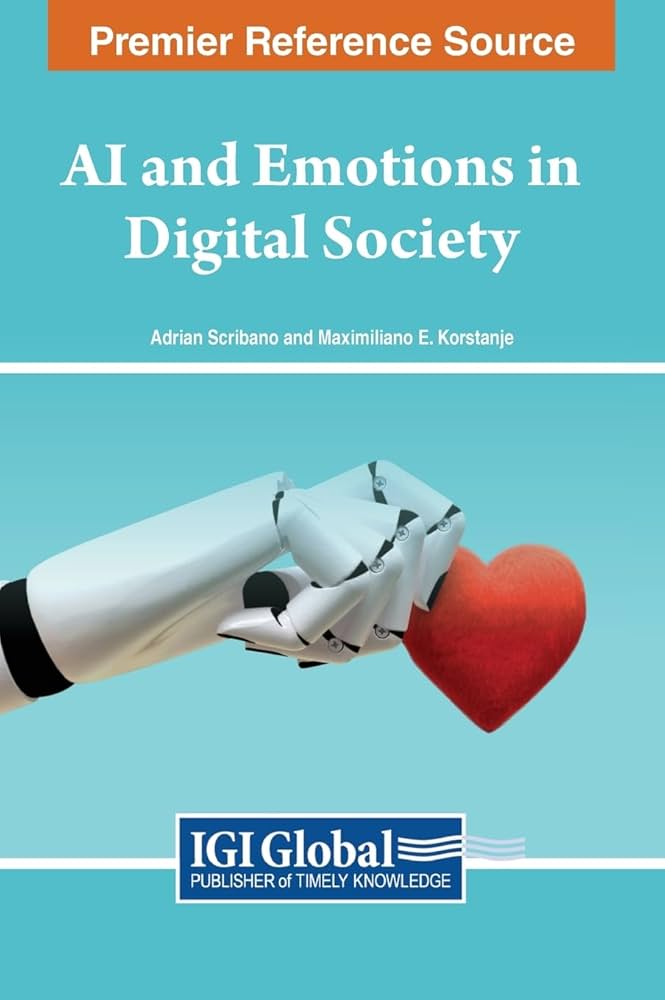 The implementation of artificial intelligence (AI) and digital technologies have become pervasive in most societies, and a new concern challenges academic scholars and social scientists; what are the conceivable, profound consequences of AI adoption within the intricate structures of society? Despite its widespread influence, this critical topic remains largely unexplored in academic circles, leaving a significant knowledge gap regarding how AI reshapes human interactions, institutions, and the fabric of a digital society. "AI and Emotions in Digital Society," edited by Adrian Scribano and Maximiliano E Korstanje, emerges to address this concern.
The implementation of artificial intelligence (AI) and digital technologies have become pervasive in most societies, and a new concern challenges academic scholars and social scientists; what are the conceivable, profound consequences of AI adoption within the intricate structures of society? Despite its widespread influence, this critical topic remains largely unexplored in academic circles, leaving a significant knowledge gap regarding how AI reshapes human interactions, institutions, and the fabric of a digital society. "AI and Emotions in Digital Society," edited by Adrian Scribano and Maximiliano E Korstanje, emerges to address this concern.
In this transformative book, readers embark on an intellectual journey exploring the intricate interplay between society, technology, and emotions. Drawing together the works of researchers in diverse disciplines and cultural backgrounds, the book fosters critical discussions that delve into the philosophical quandaries underpinning AI's influence. By adopting a balanced perspective that acknowledges both risks and opportunities, the book equips postgraduate students, professionals, policymakers, AI analysts, and social scientists with the tools to comprehend the far-reaching effects of AI on human behavior, institutions, and even democratic processes. - Publisher's Description
Request this Title
Taming Silicon Valley: How We Can Ensure That AI Works for Us
Marcus, Gary (2024)
![]() On balance, will AI help humanity or harm it? AI could revolutionize science, medicine, and technology, and deliver us a world of abundance and better health. Or it could be a disaster, leading to the downfall of democracy, or even our extinction. In Taming Silicon Valley, Gary Marcus, one of the most trusted voices in AI, explains that we still have a choice. And that the decisions we make now about AI will shape our next century. In this short but powerful manifesto, Marcus explains how Big Tech is taking advantage of us, how AI could make things much worse, and, most importantly, what we can do to safeguard our democracy, our society, and our future.
On balance, will AI help humanity or harm it? AI could revolutionize science, medicine, and technology, and deliver us a world of abundance and better health. Or it could be a disaster, leading to the downfall of democracy, or even our extinction. In Taming Silicon Valley, Gary Marcus, one of the most trusted voices in AI, explains that we still have a choice. And that the decisions we make now about AI will shape our next century. In this short but powerful manifesto, Marcus explains how Big Tech is taking advantage of us, how AI could make things much worse, and, most importantly, what we can do to safeguard our democracy, our society, and our future.
Marcus explains the potential—and potential risks—of AI in the clearest possible terms and how Big Tech has effectively captured policymakers. He begins by laying out what is lacking in current AI, what the greatest risks of AI are, and how Big Tech has been playing both the public and the government, before digging into why the US government has thus far been ineffective at reining in Big Tech. He then offers real tools for readers, including eight suggestions for what a coherent AI policy should look like—from data rights to layered AI oversight to meaningful tax reform—and closes with how ordinary citizens can push for what is so desperately needed.
"Taming Silicon Valley" is both a primer on how AI has gotten to its problematic present state and a book of activism in the tradition of Abbie Hoffman’s "Steal This Book" and Thomas Paine’s "Common Sense." It is a deeply important book for our perilous historical moment that every concerned citizen must read. - Publisher's Description
Request this Title
AI + the New Human Frontier: Reimagining the Future of Time, Trust + Truth
Orange, Erica (2024)
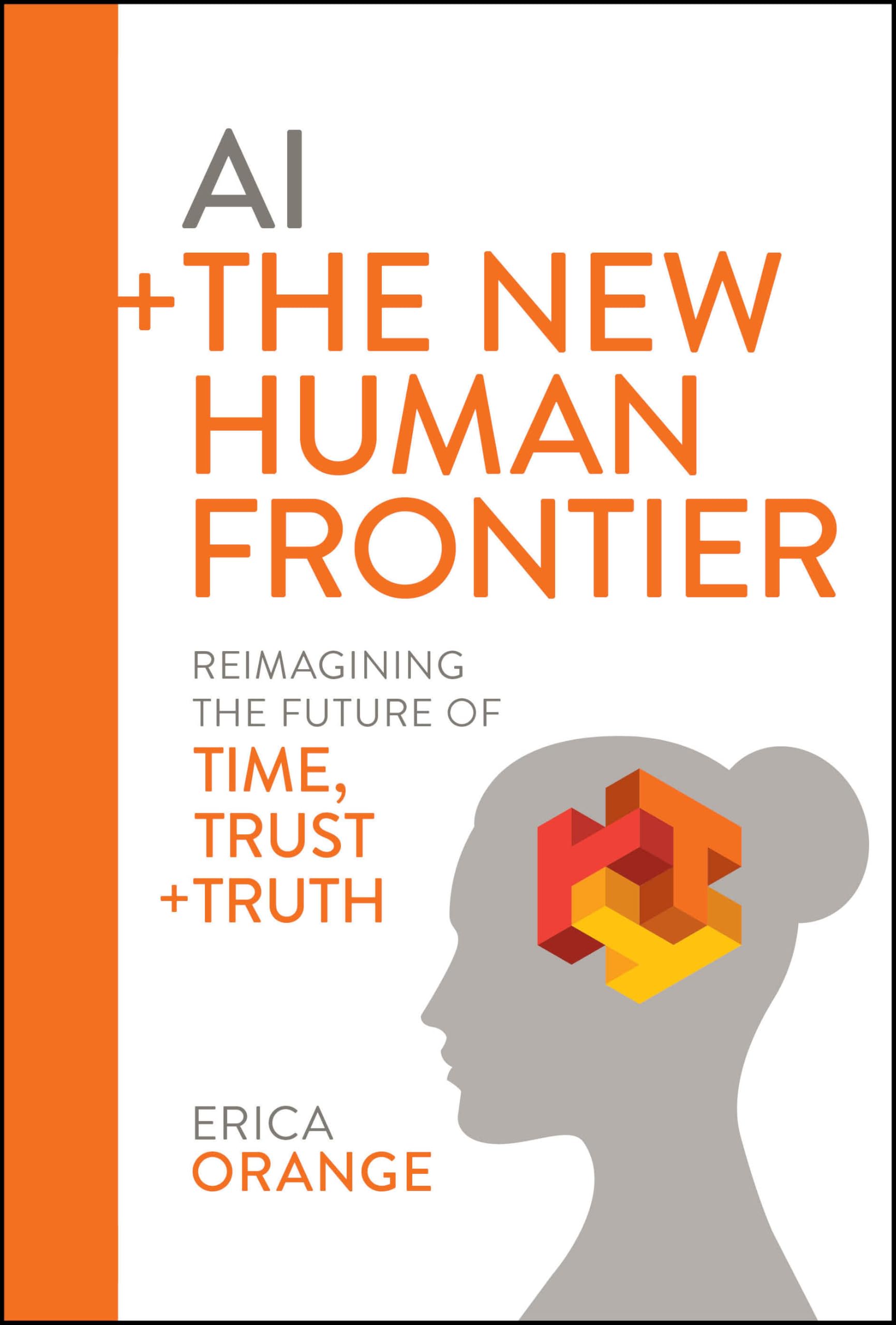 "AI + The New Human Frontier: Reimagining the Future of Time, Trust + Truth" by Erica Orange, a renowned futurist, offers a compelling exploration of generative AI's potential to enhance human creativity rather than replace it. This pivotal book navigates how AI tools will help shape the human experience, and aid in augmenting human ingenuity and imagination.
"AI + The New Human Frontier: Reimagining the Future of Time, Trust + Truth" by Erica Orange, a renowned futurist, offers a compelling exploration of generative AI's potential to enhance human creativity rather than replace it. This pivotal book navigates how AI tools will help shape the human experience, and aid in augmenting human ingenuity and imagination.
The author eloquently argues that the essence of human intelligence―our curiosity, critical thinking, empathy, and more―is not only irreplaceable but will become increasingly valuable as AI evolves to take on routine tasks. "AI + the New Human Frontier" is a clarion call for embedding trust, human oversight and judgement into AI development, ensuring that the technology amplifies our most human capabilities. At a time when the lines between what is real, fake, true and false are becoming more blurred, reliance on human-centric solutions, not just technological ones, will become more critical. - Publisher's Description
Request this Title
AI for Designers
Akhtar, Haseen; Ramkumar, Janakarajan (2024)
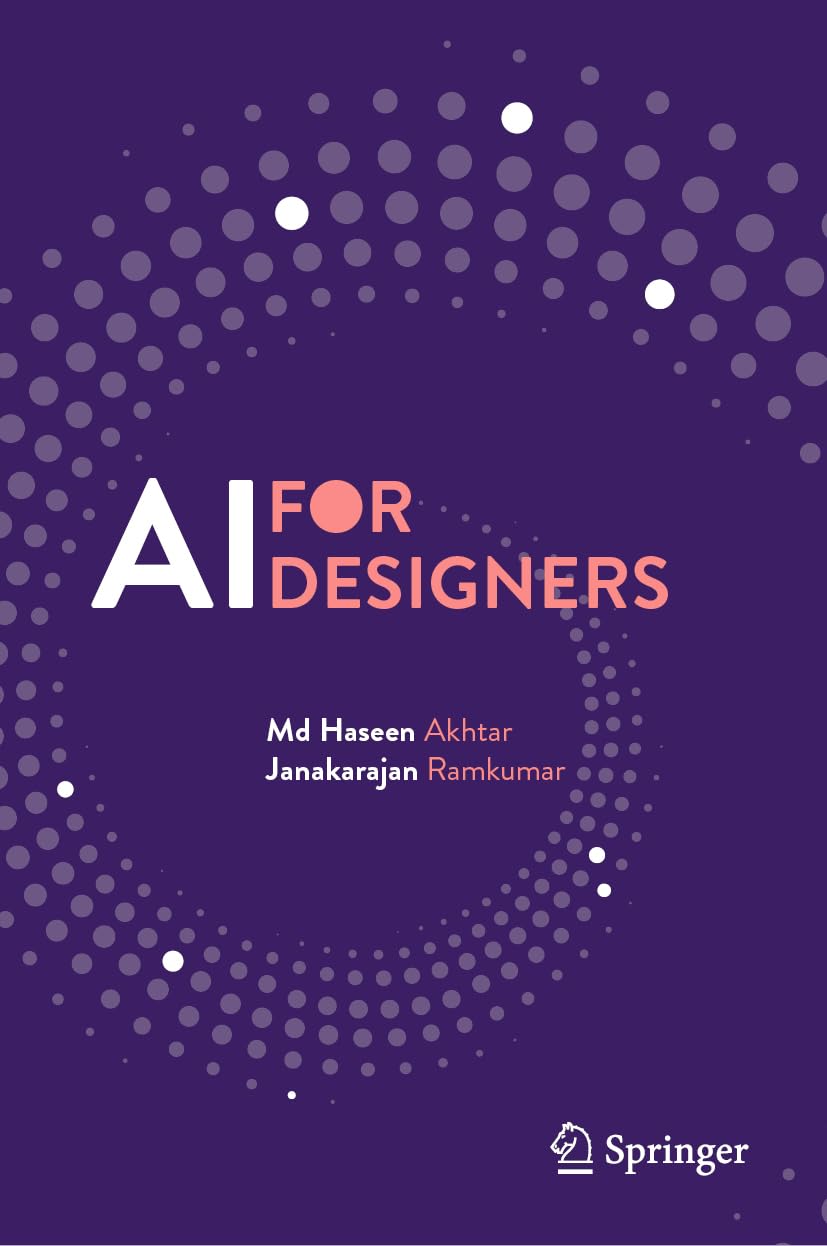 This book presents select research writings from researchers and professionals around the globe on the application, potential, and limitations of AI in different domains. The topics covered include AI in product design, AI in architecture design, AI in textile design, AI in interaction design, and AI for society in general. The book also discusses various cross-applications of AI in other industrial sectors like urban planning and design, AI for inclusive future, etc.
This book presents select research writings from researchers and professionals around the globe on the application, potential, and limitations of AI in different domains. The topics covered include AI in product design, AI in architecture design, AI in textile design, AI in interaction design, and AI for society in general. The book also discusses various cross-applications of AI in other industrial sectors like urban planning and design, AI for inclusive future, etc.
The book is a valuable reference for designers in multidisciplinary areas. This book is of interest for anyone who is a beginner, researcher, and professional interested in artificial intelligence and allied fields. - Publisher's Description
Request this Title
AI-Driven Learning and Engagement in Higher Education
Tariq, Muhammad Usman (2024)
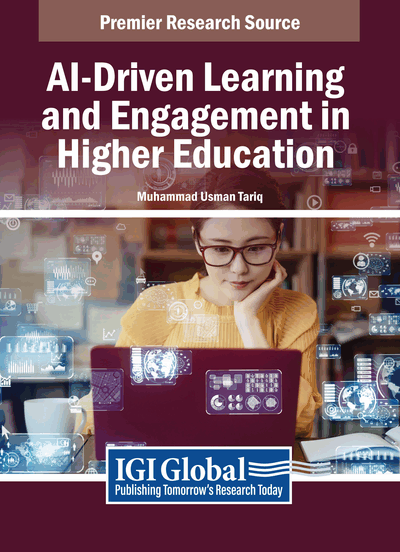 Artificial Intelligence (AI) has rapidly emerged as a revolutionary force across various sectors, with a profound influence permeating the domain of higher education. AI in higher education encompasses a wide range of applications designed to enhance teaching methodologies, streamline administrative processes, and personalize learning experiences. The transformative potential of AI lies in its ability to process vast amounts of data, identify patterns, and make intelligent decisions, which can significantly improve educational outcomes.
Artificial Intelligence (AI) has rapidly emerged as a revolutionary force across various sectors, with a profound influence permeating the domain of higher education. AI in higher education encompasses a wide range of applications designed to enhance teaching methodologies, streamline administrative processes, and personalize learning experiences. The transformative potential of AI lies in its ability to process vast amounts of data, identify patterns, and make intelligent decisions, which can significantly improve educational outcomes.
"AI-Driven Learning and Engagement in Higher Education" provides a comprehensive exploration of these themes and offers insights into the theoretical foundations, practical applications, and ethical implications of AI in education. Each chapter delves into specific aspects of AI integration, from personalized learning and intelligent tutoring systems to administrative automation and ethical considerations. Covering topics such as applied artificial intelligence, online learning, and student success, this book is an excellent resource for educators, administrators, policymakers, researchers, academicians, and more. - Publisher's Description
Request this Title
Generative AI in Higher Education: The ChatGPT Effect
Chan, Cecilia Ka Yuk; Colloton, Tom (2024)
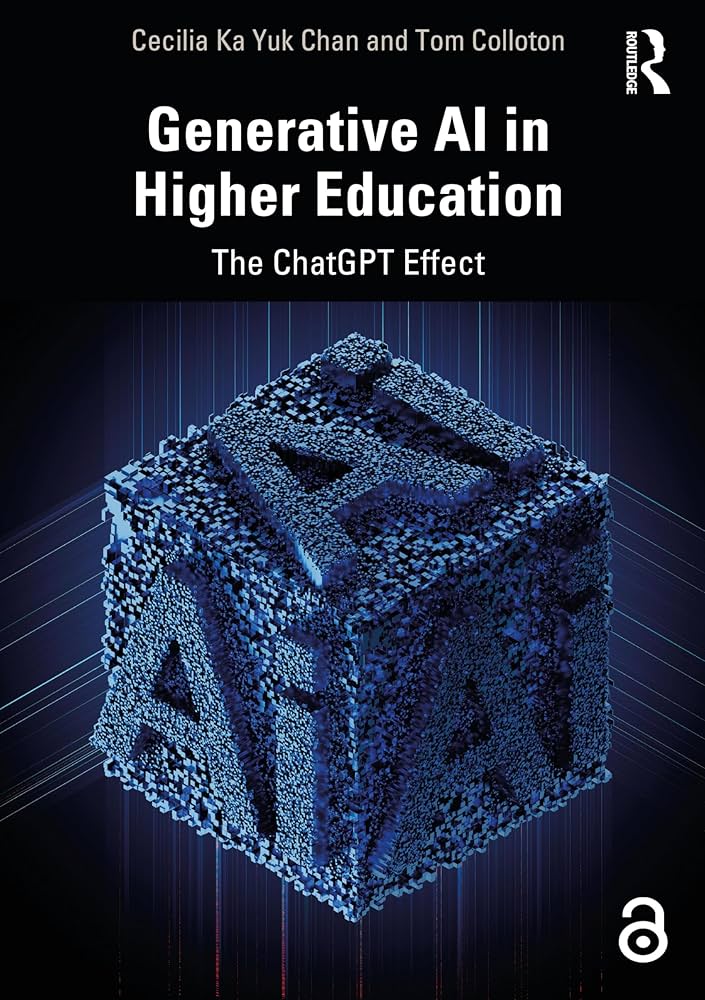 Chan and Colloton’s book is one of the first to provide a comprehensive examination of the use and impact of ChatGPT and Generative AI (GenAI) in higher education.
Chan and Colloton’s book is one of the first to provide a comprehensive examination of the use and impact of ChatGPT and Generative AI (GenAI) in higher education.
Since November 2022, every conversation in higher education has involved ChatGPT and its impact on all aspects of teaching and learning. The book explores the necessity of AI literacy tailored to professional contexts, assess the strengths and weaknesses of incorporating ChatGPT in curriculum design, and delve into the transformation of assessment methods in the GenAI era. The authors introduce the Six Assessment Redesign Pivotal Strategies (SARPS) and an AI Assessment Integration Framework, encouraging a learner-centric assessment model. The necessity for well-crafted AI educational policies is explored, as well as a blueprint for policy formulation in academic institutions. Technical enthusiasts are catered to with a deep dive into the mechanics behind GenAI, from the history of neural networks to the latest advances and applications of GenAI technologies.
With an eye on the future of AI in education, this book will appeal to educators, students and scholars interested in the wider societal implications and the transformative role of GenAI in pedagogy and research. - Publisher's Description
Request this Title
Generative AI Approaches to Sustainable Development in Higher Education
Meletiadou, Eleni (2025)
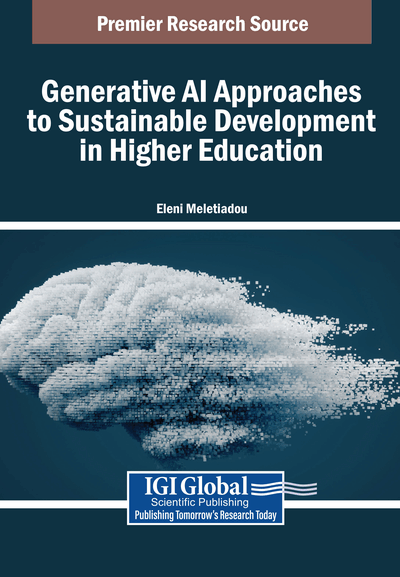 Generative Artificial Intelligence (GAI) has emerged as a transformative force in higher education, offering both challenges and opportunities. The integration of AI with Education for Sustainable Development (ESD) in Higher Education has sparked a paradigm shift in teaching, learning and assessment offering both incredible opportunities and complex challenges. Using AI-generated content in educational activities has raised equity and accessibility concerns. As a result, research is needed to explore the various challenges with the global integration of ESD and AI, particularly in terms of social justice.
Generative Artificial Intelligence (GAI) has emerged as a transformative force in higher education, offering both challenges and opportunities. The integration of AI with Education for Sustainable Development (ESD) in Higher Education has sparked a paradigm shift in teaching, learning and assessment offering both incredible opportunities and complex challenges. Using AI-generated content in educational activities has raised equity and accessibility concerns. As a result, research is needed to explore the various challenges with the global integration of ESD and AI, particularly in terms of social justice.
"Generative AI Approaches to Sustainable Development in Higher Education" explores critical aspects of integrating AI and ESD in Higher Education classrooms to achieve educational goals. It provides a balanced perspective on the responsible and effective use of these technologies (AI) and ESD in education, highlighting the need for a thoughtful, ethical, and inclusive approach to their integration. Covering topics such as immersive educational pedagogy, learning development, and intercultural communication, this book is an excellent resource for teachers, school administrators, social justice advocates, policymakers, professionals, researchers, scholars, academicians, and more. - Publisher's Description
Request this Title
Holistic Approach to AI and Leadership
Elsherif, Hesham Mohamed (2024)
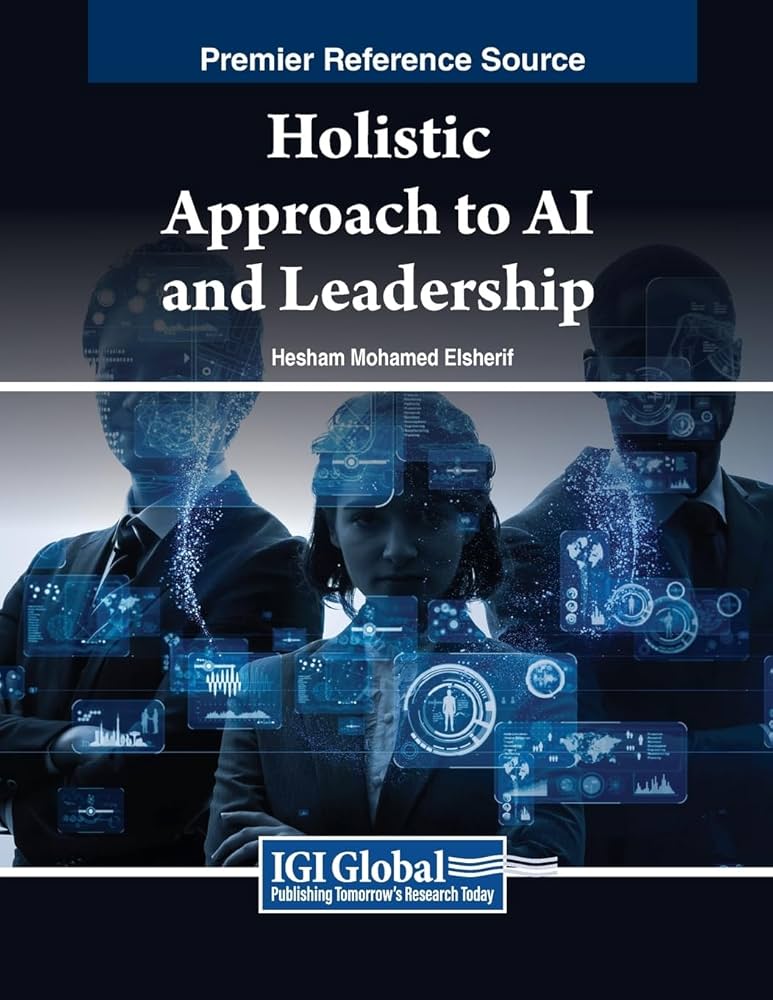 In the current fast-paced digital era, incorporating Artificial Intelligence (AI) into leadership practices is a complex challenge. The ever-evolving technological landscape demands a new approach to leadership that embraces AI while upholding human-centric values. This convergence of AI and leadership necessitates innovative solutions to stay ahead in a competitive environment.
In the current fast-paced digital era, incorporating Artificial Intelligence (AI) into leadership practices is a complex challenge. The ever-evolving technological landscape demands a new approach to leadership that embraces AI while upholding human-centric values. This convergence of AI and leadership necessitates innovative solutions to stay ahead in a competitive environment.
"The Holistic Approach to AI and Leadership" offers more than just theory; it provides practical solutions for integrating AI into strategic vision. This comprehensive guide explores AI's impact on decision-making processes, training, and capacity building, addressing resistance and measuring ROI through real-world case studies and scenarios. Targeting a diverse audience, from top-tier executives and human resources professionals to AI developers and researchers, the book equips leaders with the knowledge to make informed decisions about AI integration. By emphasizing the enduring importance of human connection and ethical considerations, this approach ensures that technological advancements enhance, rather than overshadow, the human aspects of leadership, reshaping the modern management paradigm. - Publisher's Description
Request this Title
Teachers' Roles and Perspectives on AI Integration in Schools
Çela, Eriona; Vajjhala, Narasimha Rao; Fonkam, Mathias Mbu (2024)
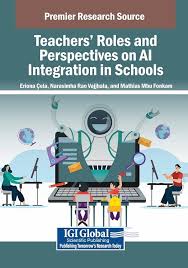 The integration of artificial intelligence (AI) in schools is reshaping the role of teachers, causing new opportunities and challenges in the classroom. As AI technologies become integrated into educational tools and curricula, teachers are positioned as academic leaders expected to guide students in navigating the ethical and practical implications of AI. Teachers' perspectives on AI integration vary, with some embracing it as a powerful tool to personalize learning, enhance student engagement, and streamline administrative tasks, while others express concerns about its potential to undermine human connection and equity in education. Understanding teachers' roles in this landscape is essential for ensuring AI is used to complement traditional pedagogies, support diverse learning needs, and foster critical thinking in students.
The integration of artificial intelligence (AI) in schools is reshaping the role of teachers, causing new opportunities and challenges in the classroom. As AI technologies become integrated into educational tools and curricula, teachers are positioned as academic leaders expected to guide students in navigating the ethical and practical implications of AI. Teachers' perspectives on AI integration vary, with some embracing it as a powerful tool to personalize learning, enhance student engagement, and streamline administrative tasks, while others express concerns about its potential to undermine human connection and equity in education. Understanding teachers' roles in this landscape is essential for ensuring AI is used to complement traditional pedagogies, support diverse learning needs, and foster critical thinking in students.
"Teachers' Roles and Perspectives on AI Integration in Schools" explores the role of academic leaders in the utilization of AI in education. It examines the various tools used by educators to assist students in intelligent technology literacy, and the challenges associated with AI innovations. This book covers topics such as curriculum design, education technology, and academic leadership, and is a useful resource for academicians, educators, computer engineers, scientists, and researchers. - Publisher's Description
Request this Title
Artificial Intelligence (AI) and Customer Social Responsibility (CSR)
Hamdan, Reem Khamis; Buallay, Amina (2024)
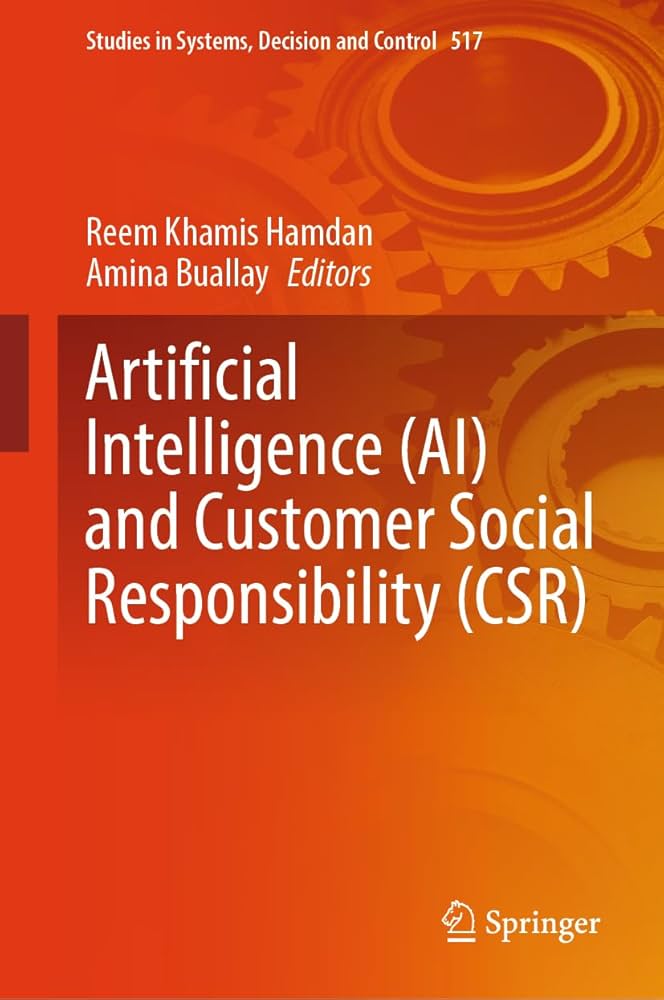 The impact of artificial intelligence (AI) on business and society has been significant, with the incorporation of AI technologies such as robots, facial recognition, algorithms, and natural language processing into business leading to both corporate benefits and potential challenges for stakeholders. The question of how to engage in responsible business practices in the era of AI is an important one, and there is a need for more research on the relationship between AI and corporate social responsibility (CSR). As AI becomes more prevalent, there is a growing focus on the ethical implications of AI and the potential for AI to perpetuate biases or to displace human workers. CSR initiatives can include considerations of ethical AI in the development and use of AI systems. AI has the potential to solve many global challenges and improve people's lives, but it can also have negative consequences if not developed and used responsibly. CSR initiatives can focus on the social impact of AI,including efforts to ensure that the benefits of AI are distributed fairly and that AI is used for the common good. CSR initiatives often involve engaging with stakeholders, including employees, customers, and communities, to understand their needs and concerns and to ensure that their interests are taken into account. This can include engaging with stakeholders about the use of AI in the organization and its potential impacts
The impact of artificial intelligence (AI) on business and society has been significant, with the incorporation of AI technologies such as robots, facial recognition, algorithms, and natural language processing into business leading to both corporate benefits and potential challenges for stakeholders. The question of how to engage in responsible business practices in the era of AI is an important one, and there is a need for more research on the relationship between AI and corporate social responsibility (CSR). As AI becomes more prevalent, there is a growing focus on the ethical implications of AI and the potential for AI to perpetuate biases or to displace human workers. CSR initiatives can include considerations of ethical AI in the development and use of AI systems. AI has the potential to solve many global challenges and improve people's lives, but it can also have negative consequences if not developed and used responsibly. CSR initiatives can focus on the social impact of AI,including efforts to ensure that the benefits of AI are distributed fairly and that AI is used for the common good. CSR initiatives often involve engaging with stakeholders, including employees, customers, and communities, to understand their needs and concerns and to ensure that their interests are taken into account. This can include engaging with stakeholders about the use of AI in the organization and its potential impacts
The adoption of AI in business is changing many aspects of doing business in a socially responsible manner, and there is a need to examine the potential unethical behaviors and novel ways of engaging in CSR that may arise. This book aims to focus on AI and CSR, and to advance our understanding of the role of AI in organizations and the literature on CSR by assembling high-quality papers with a strong connection between theory and practice. - Publisher's Description
Request this Title
Mind, Body, and Digital Brains
Santoianni, Flavia; Giannini, Gianluca; Ciasullo, Alessandro (2024)
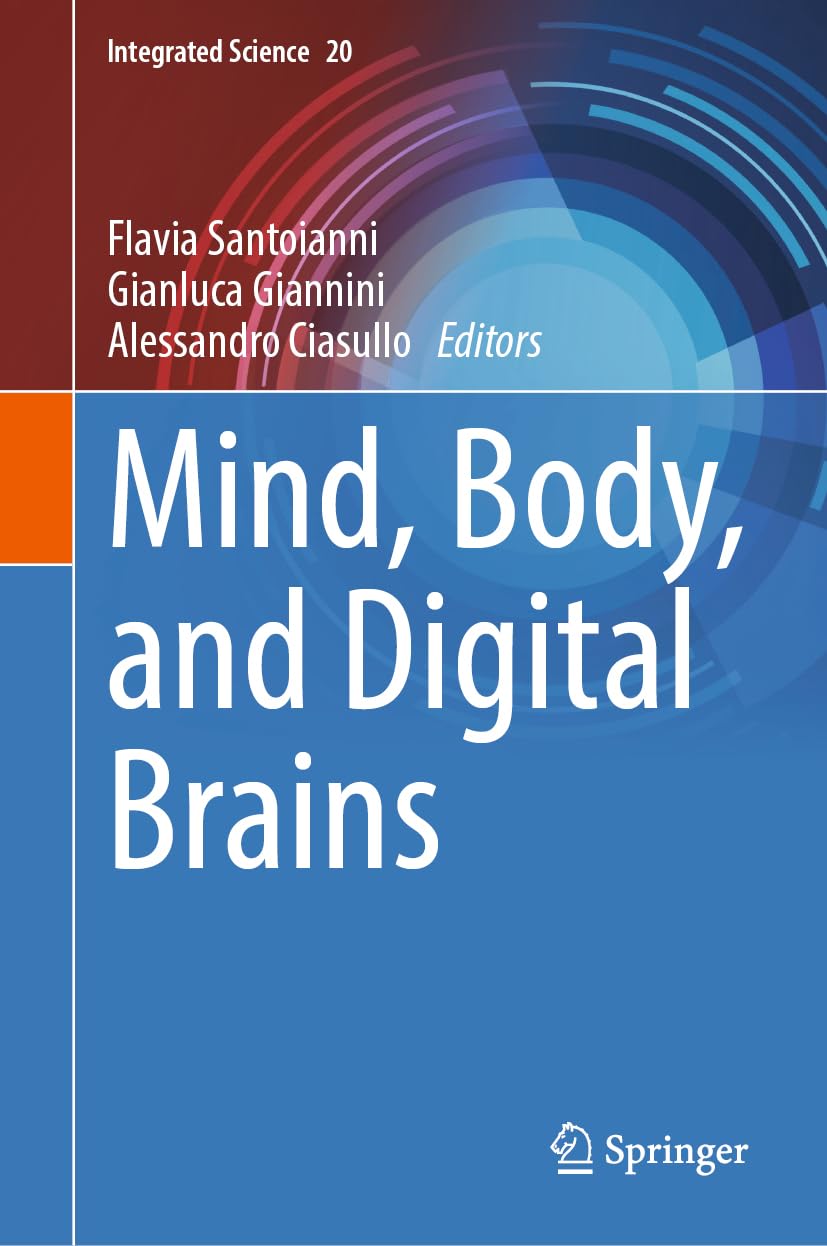 This book—"Mind, Body, and Digital Brains"—focuses on both theoretical and empirical issues and joins contributions from different disciplines, concepts, and sensibilities, bringing together scholars from fields that at first glance may appear different—Neuroscience and Cognitive Neuroscience; Robotics, Computer Science, Deep Learning, and Information Processing Systems; Education, Philosophy, Law, and Psychology. All these research fields are held together by the very object to be discussed: a broad, articulate, and polyphonic reflection on the status of theories and fields of application of Digital Technologies and Artificial Intelligence, seen from the perspective of the digital mind, digital body, and digital brain. Scientific and humanistic issues will be considered through an interdisciplinary point of view, with the purpose of deepening emerging trends about various disciplines.
This book—"Mind, Body, and Digital Brains"—focuses on both theoretical and empirical issues and joins contributions from different disciplines, concepts, and sensibilities, bringing together scholars from fields that at first glance may appear different—Neuroscience and Cognitive Neuroscience; Robotics, Computer Science, Deep Learning, and Information Processing Systems; Education, Philosophy, Law, and Psychology. All these research fields are held together by the very object to be discussed: a broad, articulate, and polyphonic reflection on the status of theories and fields of application of Digital Technologies and Artificial Intelligence, seen from the perspective of the digital mind, digital body, and digital brain. Scientific and humanistic issues will be considered through an interdisciplinary point of view, with the purpose of deepening emerging trends about various disciplines.
This book offers a framework for different perspectives and, at the same time, a platform for discussion aimed not only at experts, but also at a non-specialist public interested in the digital revolution. The digital revolution is emerging from the intertwining of ethical, philosophical, and technological aspects, which concern several general issues as cooperation, law, and environment, but also specialized as cybersecurity or algorithmic citizenship. More questions arise, concerning which opportunities and risks are associated with the new scenarios, what idea of humanity is emerging from the increasingly widespread use of Artificial Intelligence technologies, and what idea of integrated science should we promote to accompany the ongoing transformations. - Publisher's Description
Request this Title
Faik: A Practical Guide to Living in a World of Deepfakes, Disinformation, and AI-Generated Deceptions
Carpenter, Perry (2025)
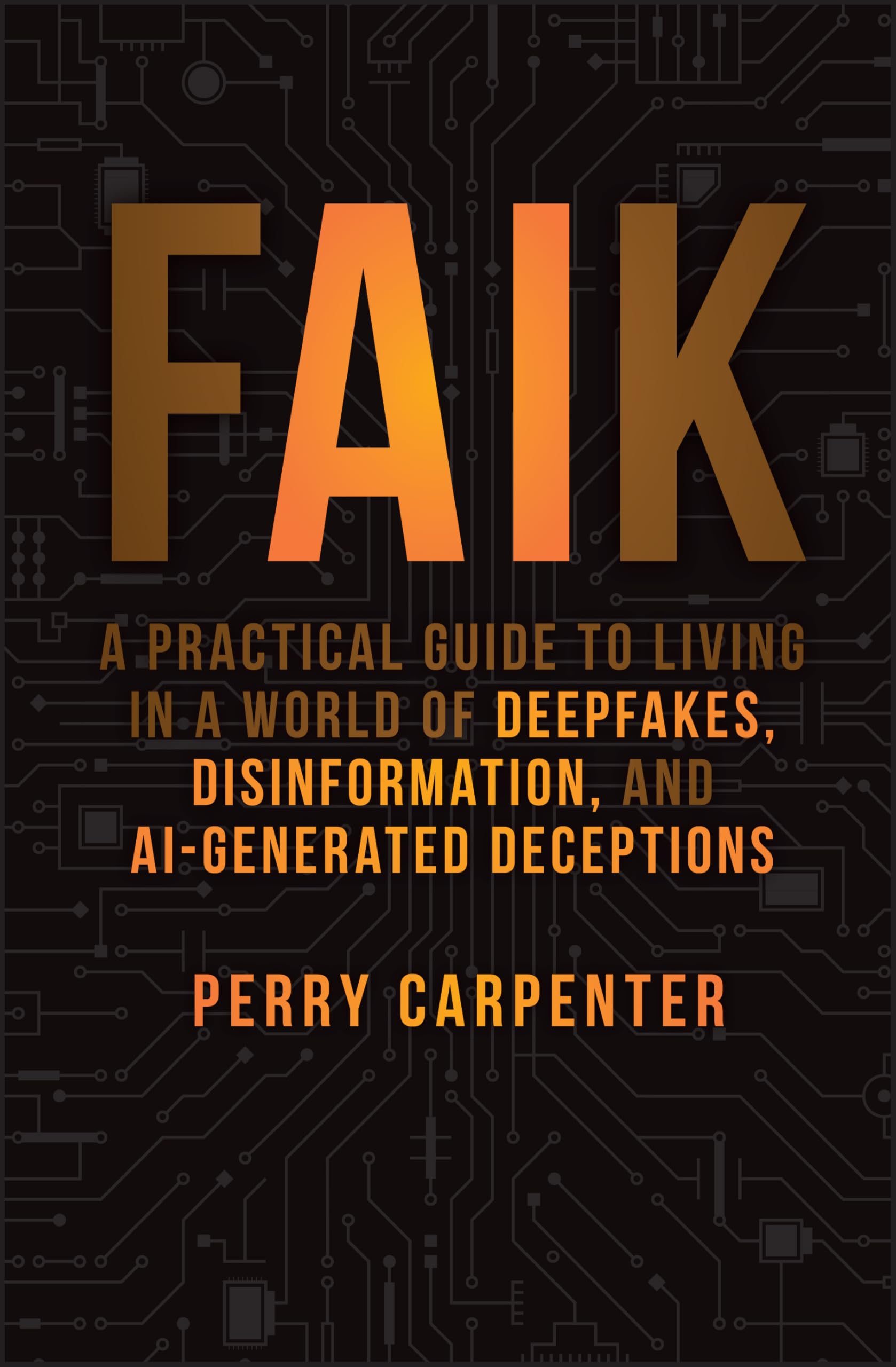 In an era where artificial intelligence can create content indistinguishable from reality, how do we separate truth from fiction? In "FAIK: A Practical Guide to Living in a World of Deepfakes, Disinformation, and AI-Generated Deceptions," cybersecurity and deception expert Perry Carpenter unveils the hidden dangers of generative artificial intelligence, showing you how to use these technologies safely while protecting yourself and others from cyber scams and threats. This book provides a crucial understanding of the potential risks associated with generative AI, like ChatGPT, Claude, and Gemini, offering effective strategies to avoid falling victim to their more sinister uses.
In an era where artificial intelligence can create content indistinguishable from reality, how do we separate truth from fiction? In "FAIK: A Practical Guide to Living in a World of Deepfakes, Disinformation, and AI-Generated Deceptions," cybersecurity and deception expert Perry Carpenter unveils the hidden dangers of generative artificial intelligence, showing you how to use these technologies safely while protecting yourself and others from cyber scams and threats. This book provides a crucial understanding of the potential risks associated with generative AI, like ChatGPT, Claude, and Gemini, offering effective strategies to avoid falling victim to their more sinister uses.
This isn't just another book about technology – it's your survival guide to the digital jungle. Carpenter takes you on an insightful journey through the "Exploitation Zone," where rapid technological advancements outpace our ability to adapt, creating fertile ground for deception. Explore the mechanics behind deepfakes, disinformation, and other cognitive security threats. Discover how cybercriminals can leverage even the most trusted AI systems to create and spread synthetic media and use it for malicious purposes. At its core, "FAIK" is an empowering exposé in which Carpenter effectively weaves together engaging narratives and practical insights, all aimed to equip you with the knowledge to recognize and counter advanced tactics with practical media literacy skills and a deep understanding of social engineering. - Publisher's Description
Request this Title
Critical Making in the Age of AI
Johnson, Emily; Salter, Anastasia (2025)
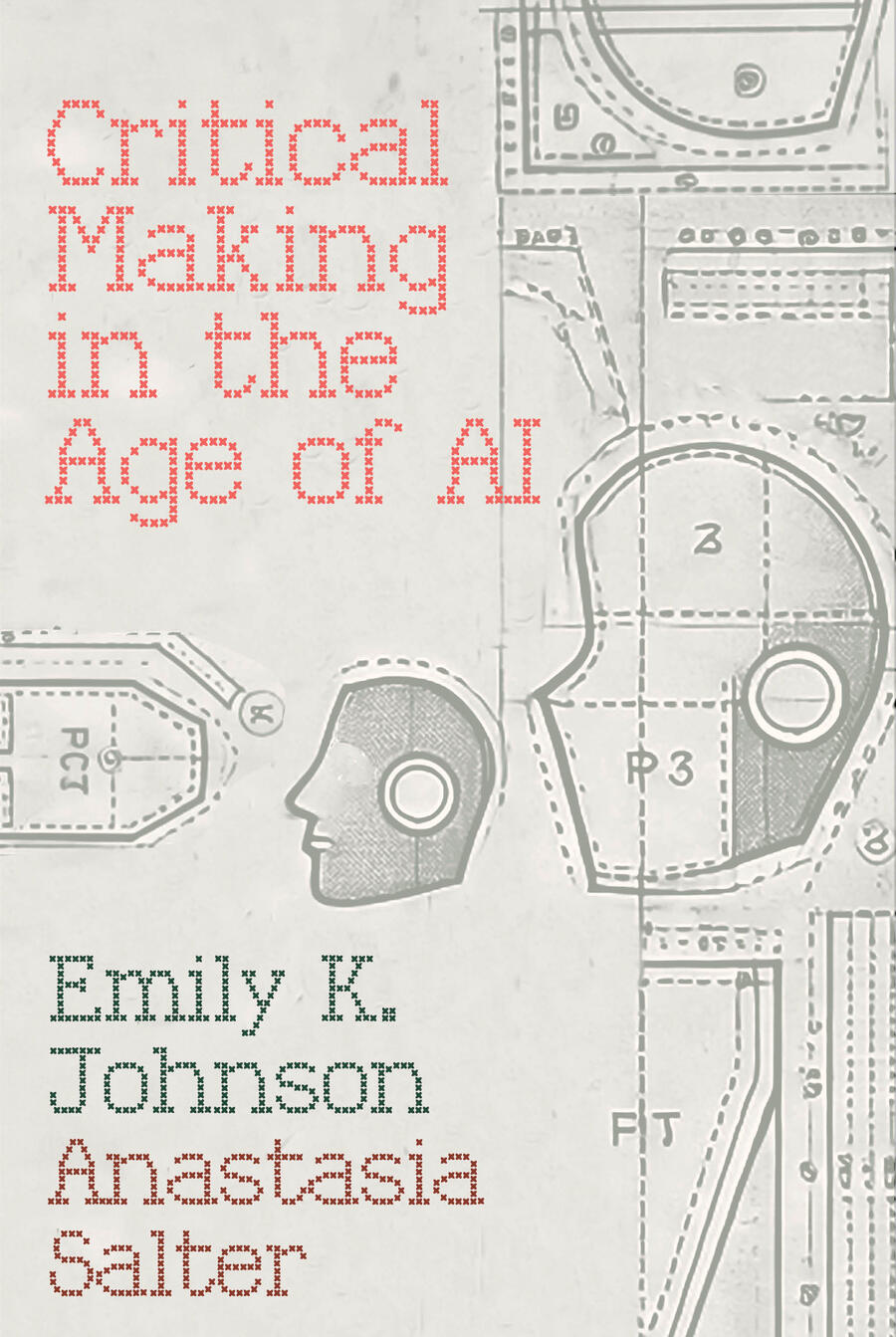 "Critical Making in the Age of AI" invites students, teachers, learners, and digital humanists to explore making as scholarship. Inspired by the craft traditions of textile arts, this book combines a survey of forms of alternative scholarly communication—such as comics, GIFs, maps, games, and generative AI—and a pattern book, where patterns serve as starting points that makers can reimagine and remix. Firmly grounded in the humanities and utilizing free tools and platforms (including Twine, Voyant, and Tracery) wherever possible, this engaging and accessible guide to digital methods introduces and puts into practice concepts that are essential to preparing students to navigate a changing landscape of media and information without investing in proprietary software, dedicated lab space, or expensive creative tools.
"Critical Making in the Age of AI" invites students, teachers, learners, and digital humanists to explore making as scholarship. Inspired by the craft traditions of textile arts, this book combines a survey of forms of alternative scholarly communication—such as comics, GIFs, maps, games, and generative AI—and a pattern book, where patterns serve as starting points that makers can reimagine and remix. Firmly grounded in the humanities and utilizing free tools and platforms (including Twine, Voyant, and Tracery) wherever possible, this engaging and accessible guide to digital methods introduces and puts into practice concepts that are essential to preparing students to navigate a changing landscape of media and information without investing in proprietary software, dedicated lab space, or expensive creative tools.
The book’s eight patterns are especially appropriate for those just beginning to explore digital scholarly methods, and one goal of "Critical Making in the Age of AI" is to provide structure for work that is both meaningful and achievable with limited resources and time. By centering critical making through a design-justice and feminist lens, the coauthors model how inclusive and expansive approaches to making in research and teaching are vital to shaping the humanities of the future. - Publisher's Description
Request this Title
Streaming Movies
The Thinking Game
Starring Demis Hassabis; Eleanor Maguire; Shane Legg (2024)
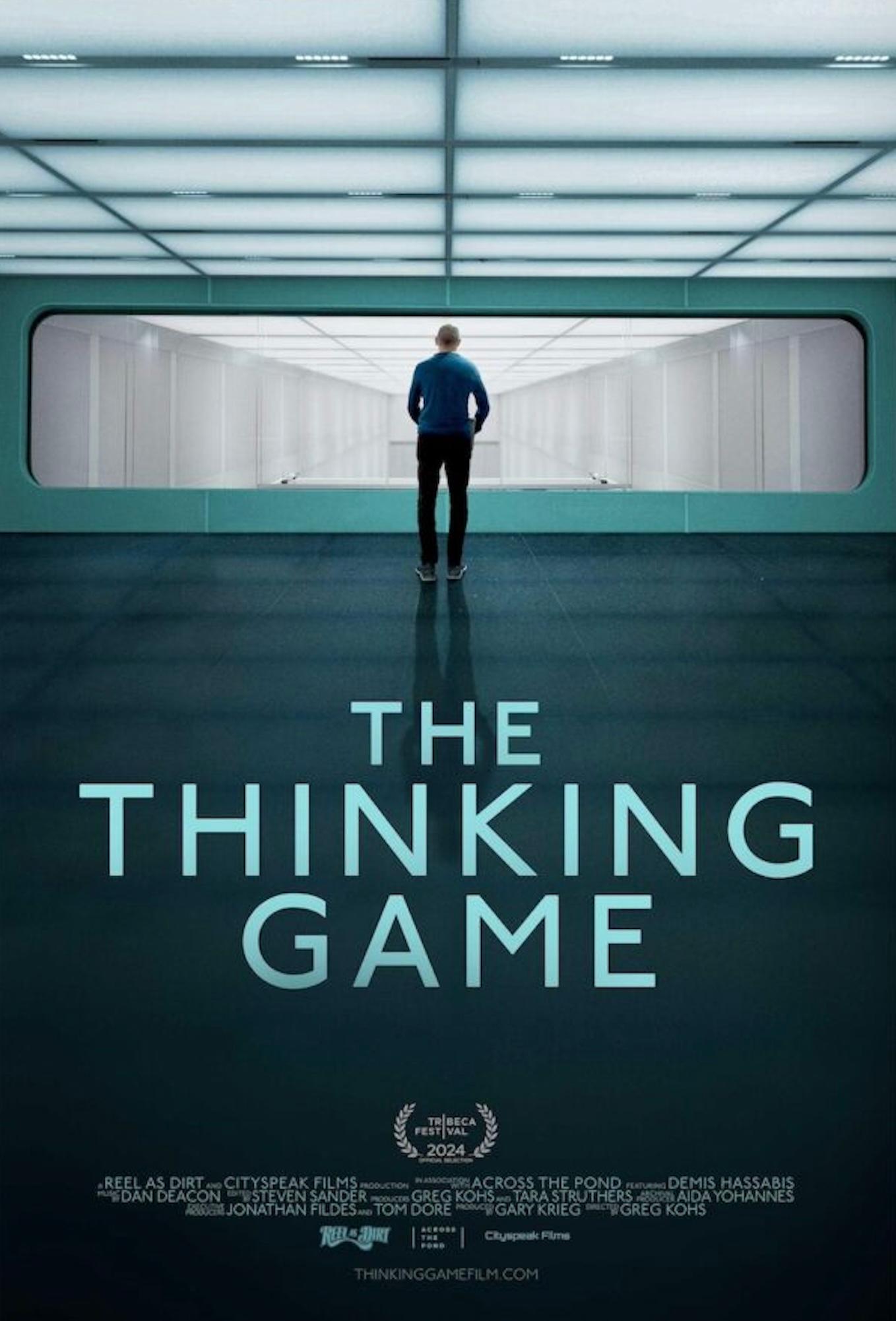 "The Thinking Game" takes you on a fascinating journey into the heart of DeepMind, one of the world’s leading AI labs, as it strives to unravel the mysteries of artificial general intelligence (AGI).
"The Thinking Game" takes you on a fascinating journey into the heart of DeepMind, one of the world’s leading AI labs, as it strives to unravel the mysteries of artificial general intelligence (AGI).
<
Inside DeepMind’s London headquarters, founder Demis Hassabis and his team are relentlessly pursuing the creation of AI that matches or surpasses human abilities on a wide range of tasks. Filmed over five years, the documentary puts viewers in the room for the pivotal moments of this quest, including the groundbreaking achievement of AlphaFold, a program that solved a 50-year grand challenge in biology.
<
"The Thinking Game" captures the exhilaration of historic breakthroughs like AlphaFold, the crushing weight of disappointment during setbacks, and the unwavering pursuit of knowledge that defines Demis’ commitment to scientific innovation. This film invites viewers to witness one of the most important scientific adventures of our time, exploring the potential of AGI to reshape our world.
watch online
A Brief History of the Future: Episode 4 - Human
Starring Rafael Agustin; Alua Arthur; Jenny Barlow (2024)
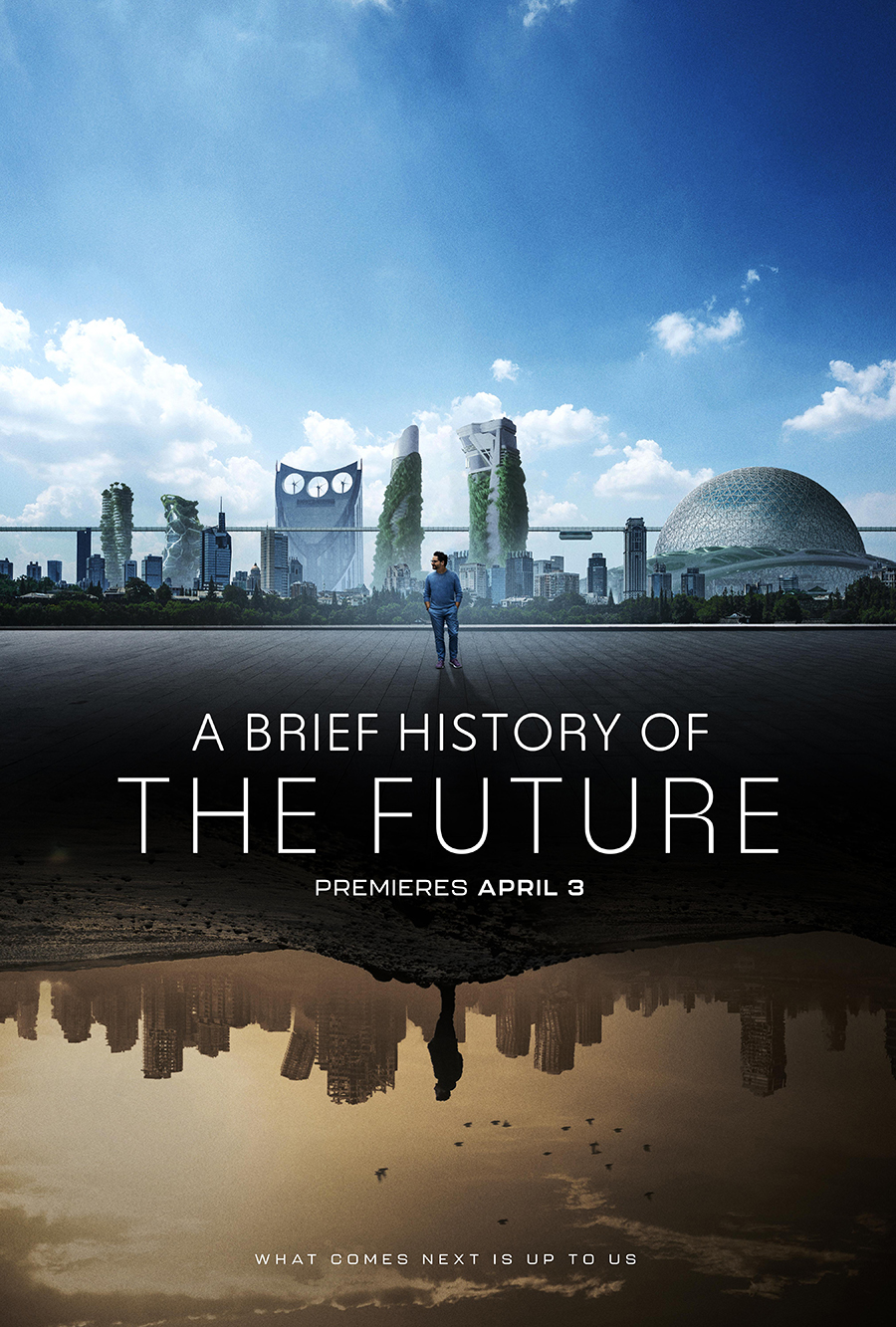 Ari Wallach investigates the human ability to increase empathy and compassion, what values we are instilling into artificial intelligence technologies, and creating a better world for human life to flourish on this planet.
Ari Wallach investigates the human ability to increase empathy and compassion, what values we are instilling into artificial intelligence technologies, and creating a better world for human life to flourish on this planet.
watch online
The Joy of AI
Starring Jim Al-Khalili (2018)
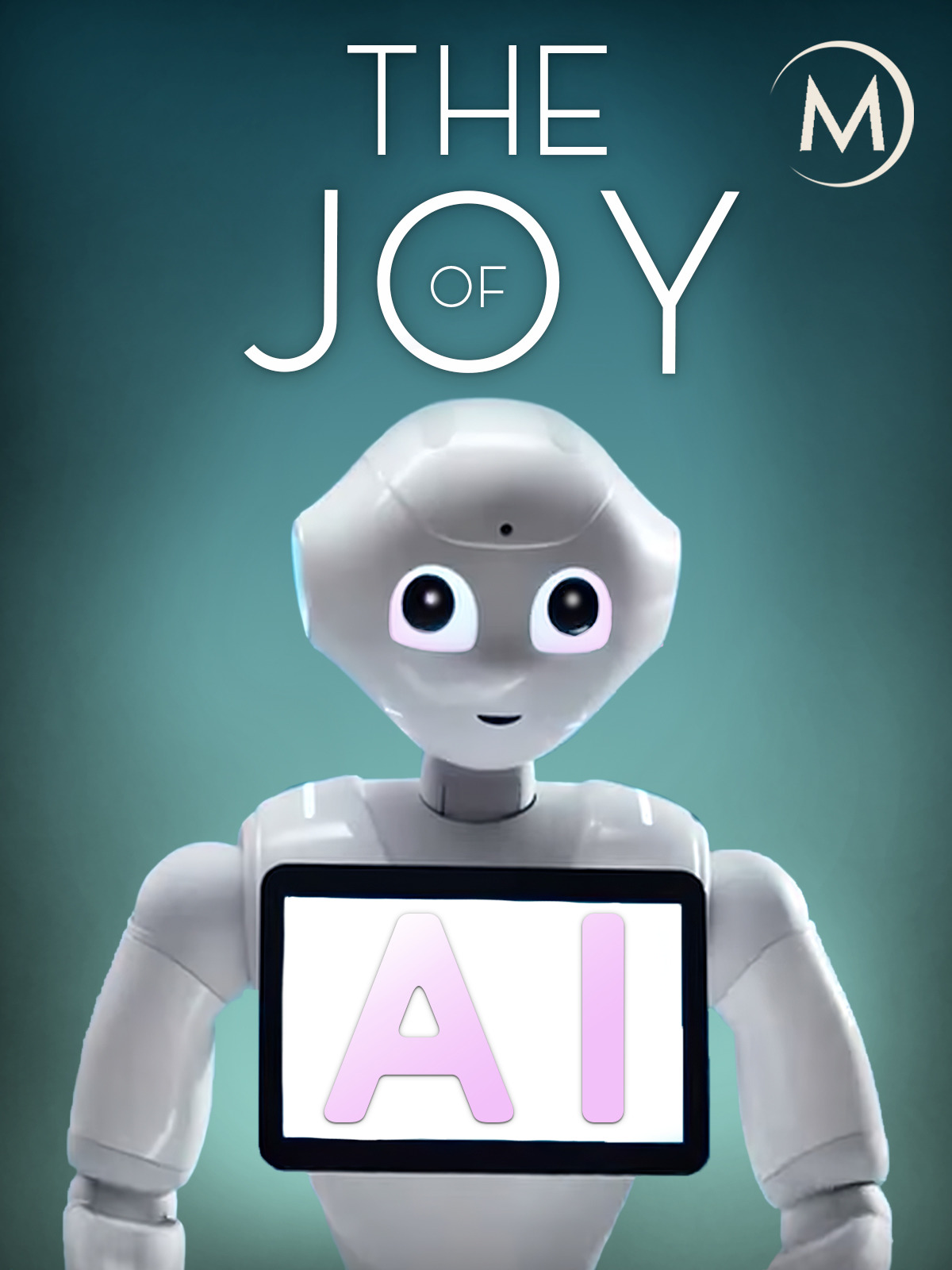 Jim Al-Khalili investigates the progress of artificial intelligence, and what is easier and more difficult for robots to do than the human brain.
Jim Al-Khalili investigates the progress of artificial intelligence, and what is easier and more difficult for robots to do than the human brain.
watch online
The Iron Giant
Starring Eli Marienthal; Harry Connick Jr.; Jennifer Aniston (1999)
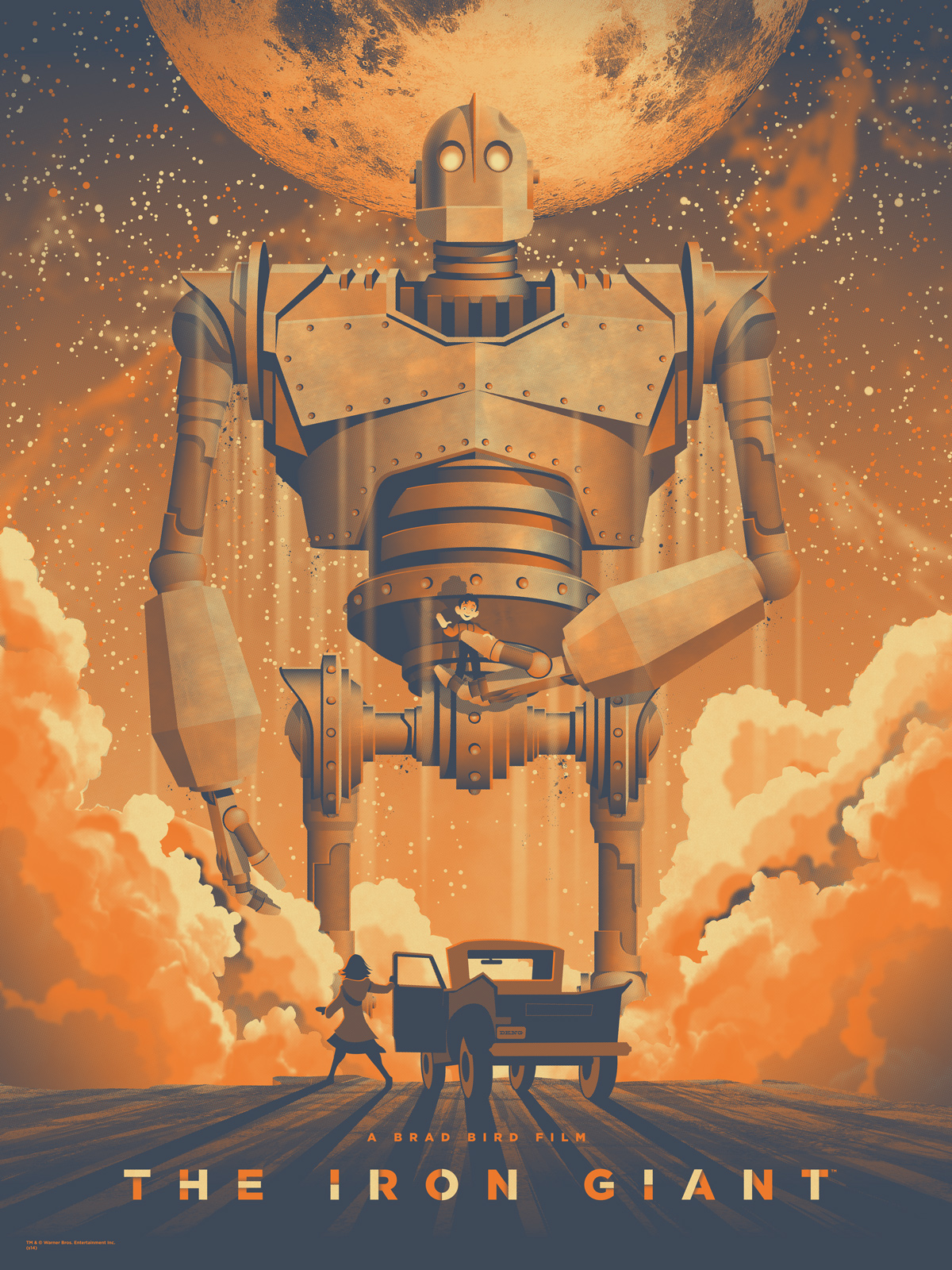 In this animated adaptation of Ted Hughes' Cold War fable, a giant alien robot (Vin Diesel) crash-lands near the small town of Rockwell, Maine, in 1957. Exploring the area, a local 9-year-old boy, Hogarth, discovers the robot, and soon forms an unlikely friendship with him. When a paranoid government agent, Kent Mansley, becomes determined to destroy the robot, Hogarth and beatnik Dean McCoppin (Harry Connick Jr.) must do what they can to save the misunderstood machine.
In this animated adaptation of Ted Hughes' Cold War fable, a giant alien robot (Vin Diesel) crash-lands near the small town of Rockwell, Maine, in 1957. Exploring the area, a local 9-year-old boy, Hogarth, discovers the robot, and soon forms an unlikely friendship with him. When a paranoid government agent, Kent Mansley, becomes determined to destroy the robot, Hogarth and beatnik Dean McCoppin (Harry Connick Jr.) must do what they can to save the misunderstood machine.
watch online
The Stepford Wives
Starring Nicole Kidman; Bette Midler; Matthew Broderick (2004)
 After enduring setbacks in her television career, executive Joanna Eberhart (Nicole Kidman) relocates with her family from New York City to the Connecticut suburb of Stepford. While Joanna's husband, Walter (Matthew Broderick), quickly warms up to their new town, she has a hard time adjusting to Stepford's manicured environs and the overly accommodating attitude of the area women. Soon Joanna begins to suspect that something is not right, and she tries to uncover Stepford's secret.
After enduring setbacks in her television career, executive Joanna Eberhart (Nicole Kidman) relocates with her family from New York City to the Connecticut suburb of Stepford. While Joanna's husband, Walter (Matthew Broderick), quickly warms up to their new town, she has a hard time adjusting to Stepford's manicured environs and the overly accommodating attitude of the area women. Soon Joanna begins to suspect that something is not right, and she tries to uncover Stepford's secret.
watch online
A.I. Artificial Intelligence
Starring Haley Joel Osment; Jude Law; Frances O'Connor (2001)
 In the not-so-far future the polar ice caps have melted and the resulting rise of the ocean waters has drowned all the coastal cities of the world. Withdrawn to the interior of the continents, the human race keeps advancing, reaching the point of creating realistic robots (called mechas) to serve them. One of the mecha-producing companies builds David, an artificial kid which is the first to have real feelings, especially a never-ending love for his "mother", Monica. Monica is the woman who adopted him as a substitute for her real son, who remains in cryo-stasis, stricken by an incurable disease. David is living happily with Monica and her husband, but when their real son returns home after a cure is discovered, his life changes dramatically.
In the not-so-far future the polar ice caps have melted and the resulting rise of the ocean waters has drowned all the coastal cities of the world. Withdrawn to the interior of the continents, the human race keeps advancing, reaching the point of creating realistic robots (called mechas) to serve them. One of the mecha-producing companies builds David, an artificial kid which is the first to have real feelings, especially a never-ending love for his "mother", Monica. Monica is the woman who adopted him as a substitute for her real son, who remains in cryo-stasis, stricken by an incurable disease. David is living happily with Monica and her husband, but when their real son returns home after a cure is discovered, his life changes dramatically.
watch online
Ex Machina
Starring Alicia Vikander; Domhnall Gleeson; Oscar Isaac (2014)
 Caleb Smith (Domhnall Gleeson) a programmer at a huge Internet company, wins a contest that enables him to spend a week at the private estate of Nathan Bateman (Oscar Isaac), his firm's brilliant CEO. When he arrives, Caleb learns that he has been chosen to be the human component in a Turing test to determine the capabilities and consciousness of Ava (Alicia Vikander), a beautiful robot. However, it soon becomes evident that Ava is far more self-aware and deceptive than either man imagined.
Caleb Smith (Domhnall Gleeson) a programmer at a huge Internet company, wins a contest that enables him to spend a week at the private estate of Nathan Bateman (Oscar Isaac), his firm's brilliant CEO. When he arrives, Caleb learns that he has been chosen to be the human component in a Turing test to determine the capabilities and consciousness of Ava (Alicia Vikander), a beautiful robot. However, it soon becomes evident that Ava is far more self-aware and deceptive than either man imagined.
watch online
Blade Runner
Starring Harrison Ford; Rutger Hauer; Sean Young (1982)
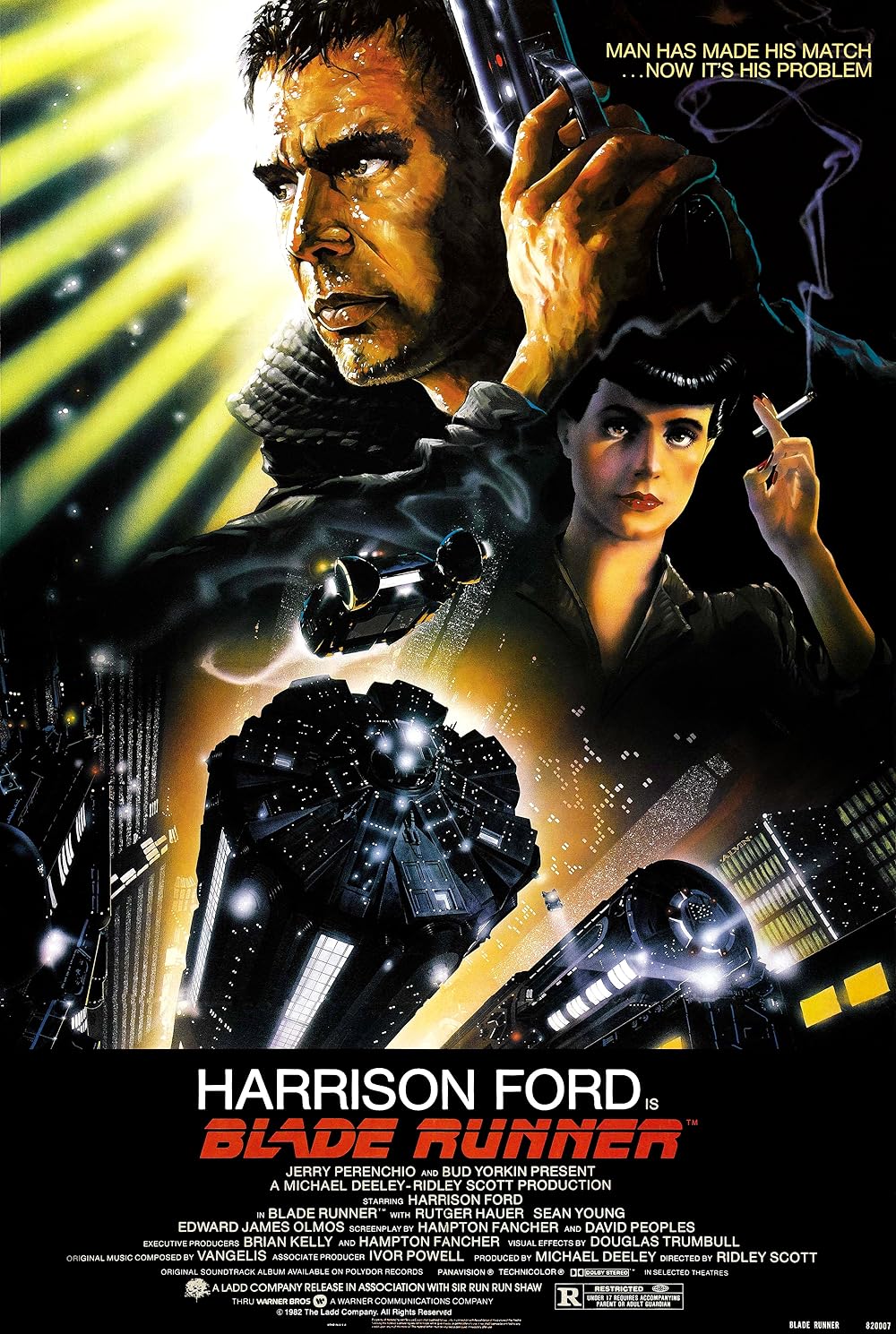 Deckard (Harrison Ford) is forced by the police Boss (M. Emmet Walsh) to continue his old job as Replicant Hunter. His assignment: eliminate four escaped Replicants from the colonies who have returned to Earth. Before starting the job, Deckard goes to the Tyrell Corporation and he meets Rachel (Sean Young), a Replicant girl he falls in love with.
Deckard (Harrison Ford) is forced by the police Boss (M. Emmet Walsh) to continue his old job as Replicant Hunter. His assignment: eliminate four escaped Replicants from the colonies who have returned to Earth. Before starting the job, Deckard goes to the Tyrell Corporation and he meets Rachel (Sean Young), a Replicant girl he falls in love with.
watch online
